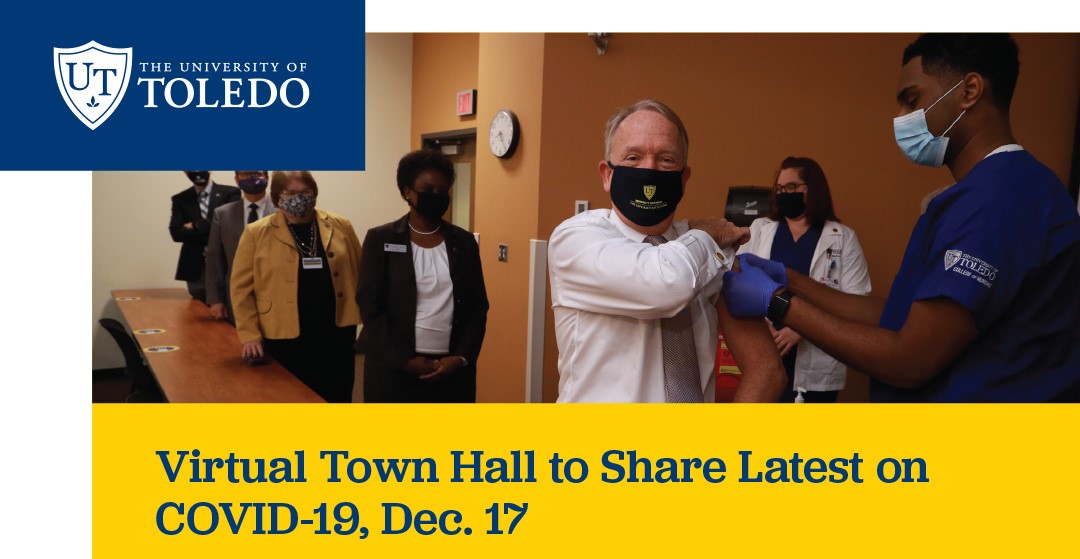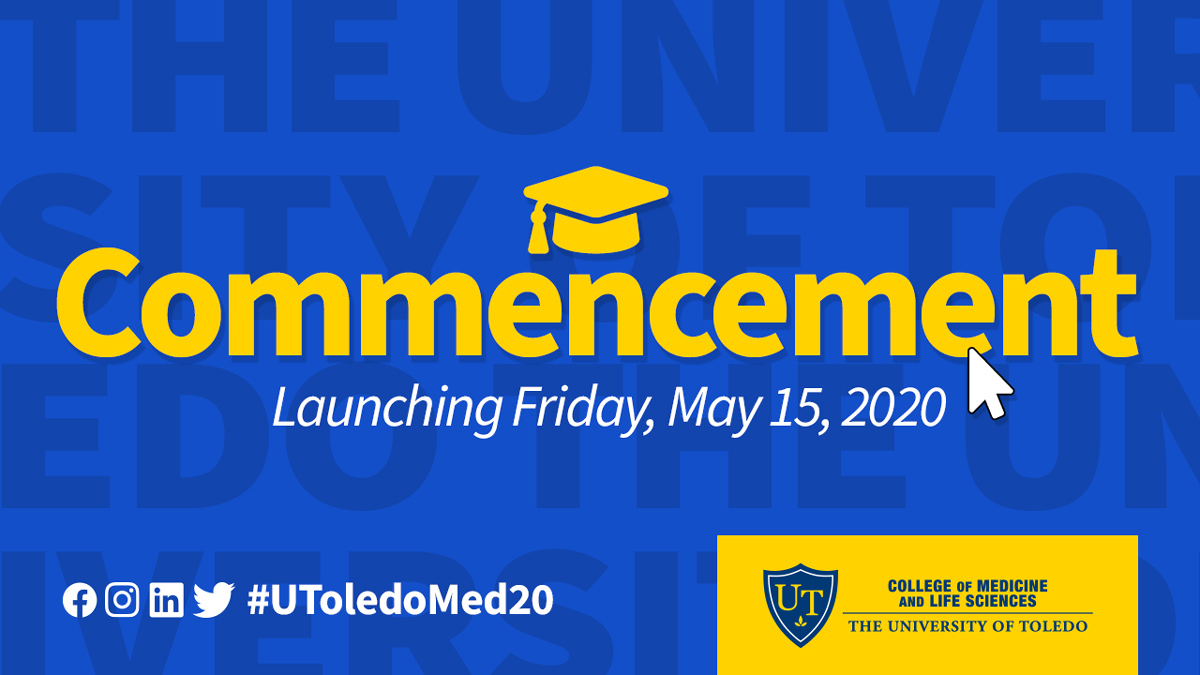2020 News and Awards



Hospitals across northwest Ohio are experiencing dangerously high occupancy rates due to COVID-19. Join us to hear the latest from University of Toledo infectious disease and virology experts, who will focus on the facts and share current research and treatment initiatives underway.
Titled "UToledo Experts Address COVID-19: Updates and Vaccine Information,"
the WebEx Town Hall hosted by Dr. Cooper is Thursday, Dec. 17, from 5:30 to 6:30 p.m.
Presenters include:
• Saurabh Chattopadhyay, Ph.D.
Assistant Professor, Medical Microbiology and Immunology
• Joan Duggan, M.D.
Professor, Department of Medicine, Infectious Disease
• Jennifer Hanrahan, D.O.
Associate Professor, Department of Medicine, Infectious Disease
• Jason F. Huntley, Ph.D.
Associate Professor, Medical Microbiology and Immunology
• Travis Taylor, Ph.D.
Assistant Professor, Medical Microbiology and Immunology
Virologist, Flavivirus Innate Immunity

Congratulations!
Brenden Tully successfully defended his thesis titled: "A Francisella tularensis Chitinase Contributes to Bacterial Persistence and Replication in Two Major U.S. Tick Vectors".
Advisor: Jason Huntley, Ph.D.

Dr. Saurabh Chattopadhyay, a viral immunologist and assistant professor in the Department of Medical Microbiology and Immunology, was recently interviewed for a story in Knowable Magazine.
Titled "It's not just the germs — it's also the genes," the article discusses how sick pathogens can make us, depending on genetic variations. It also references an article in Annual Review of Virology, to which Dr. Chattopadhyay contributed.
Knowable Magazine is from Annual Reviews, a nonprofit publisher dedicated to synthesizing and integrating knowledge for the progress of science and the benefit of society.
Click Here to Read the Article

Dr. Bob Blumenthal, Distinguished University Professor of Medical Microbiology and Immunology, recently published a major epigenetics review on structure and function of DNA/RNA methyltransferases in Nucleic Acids Research [11.2 impact factor], that was chosen to be the cover article.
This is his fourth cover article with that journal, all of them coauthored with M.D. Anderson principal investigator Dr. Xiaodong Cheng. See: Woodcock, C.B., Horton, J.R., Zhang, X., Blumenthal, R.M., and Cheng, X. 2020. Beta class amino methyltransferases from bacteria to humans: evolution and structural consequences. Nucleic Acids Res. 48: 10034-10044. PMID: 32452412.
Congratulations to Brenden Tully, an MSBS student in the lab of Dr. Huntley, for a published review titled "Mechanisms Affecting the Acquisition, Persistence and Transmission of Francisella tularensis in Ticks" published in microorganisms.

Congratulations to Iluja Gautam, a PhD student in the lab of Dr. Randall Worth, lead author on an article:
Facilitating Platelet Responses to Infection and Inflammation" in Biology (Basel).

UToledo News: UToledo Awarded $1.1 Million Federal Grant to Advance Clean Water Technology

Searching for new ways to address the growing threat to drinking water in northwest Ohio and across the globe, Dr. Jason Huntley discovered that native freshwater bacteria can destroy toxins produced during harmful algal blooms.
The University of Toledo scientist has now received a $1.1 million grant from the National Oceanic and Atmospheric Administration to advance that research into real-world solutions.
Click Here for the Full ArticleThere's a new COVID-19-related publication from UToledo researchers who examined 1,900+ patients with various comorbidities, which shows that some of these diseases have the potential to increase the ability of the virus to infect target organs.
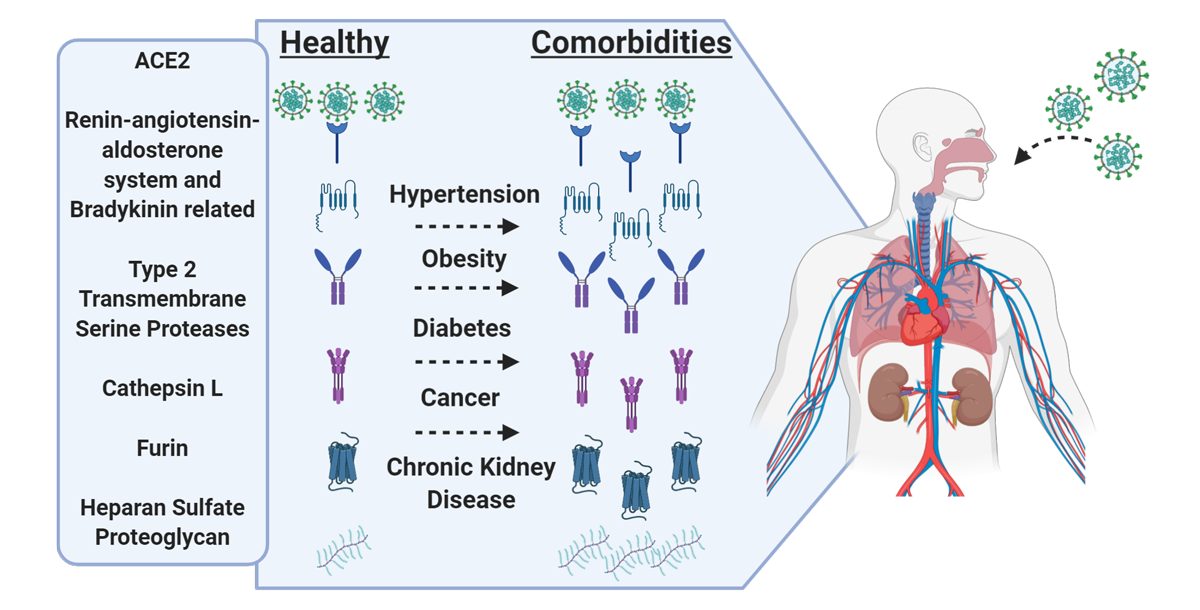
The publication, "Impact of Comorbidities on SARS-CoV-2 Viral Entry-Related Genes," was led by graduate student Joshua Breidenbach (from the lab of Drs. David Kennedy and Steven Haller) and chosen as the Feature paper in the Journal of Personalized Medicine. The full team included Drs. Prabhat Dube, Ms. Subhanwita Ghosh, Mr. Belal Abdullah, and Drs. David Kennedy, Steven Haller, Nikolai Modyanov, Deepak Malhotra, and Lance Dworkin.
Click Here to Read Full Article
MMI faculty member, Dr. Saurabh Chattopadhyay, works with local health officials to utilize testing of raw sewage water to get a better grasp of COVID-19 levels

The Chattopadhyay Lab has recently been involved in state-wide COVID-19 surveillance in the wastewater collected from the wastewater treatment plants from the Toledo area.
A large number of growing evidence, including reports from the CDC, suggest that the COVID-19-causing virus, i.e., SARS-CoV-2, can be shed from the feces of COVID-19 patients. This led to the possibility that the infectious virus itself or its gene fragment can be detected in the raw sewage. Therefore, the SARS-CoV-2 signature in the wastewater can be a leading indicator of the pandemic's progression.
The Chattopadhyay Lab is analyzing the wastewater samples for the presence of the SARS-CoV-2 gene fragment. Drs. Dae-wook Kang (Civil Eng.), Travis Taylor (MMI), and Ritu Chakravarti (Phys. Pharm.) are closely collaborating in this project.

MMI Faculty member serves on special emphasis panel reviewing COVID-19 emergency awards
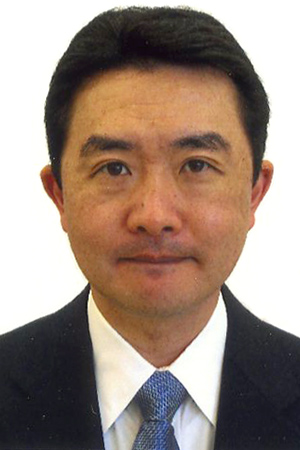
The panel name was "Emergency Awards: Rapid Investigation of Severe Acute Respiratory Syndrome Coronavirus 2 (SARS-CoV-2) and Coronavirus Disease 2019 (COVID-19)."
Congratulations, Sara Moore!

Sara is an MD/Ph.D. student in the laboratory of Dr. Viviana Ferreira in the Department of Medical Microbiology and Immunology.
UT Health Science Campus Retirees Scholarship Endowment Fund is able to grant two $1,000 scholarships for students in the Health Science Campus Graduate College’s Doctor of Philosophy Degree programs in the Biomedical Sciences or Master of Science in Biomedical Science degree programs. The candidates were selected based on academic excellence and valuable contributions to the campus and/or community.
MMI Faculty member awarded $1M NOAA grant

As Northwest Ohio residents are well aware, HAB toxins, including microcystin-LR (MC-LR),
pose major public health risks. MC-LR can cause a range of illnesses in humans and
animals, including liver cancer, inflammatory bowel disease, skin lesions, neurological
disorders, hypovolemic shock, and death. The 2014 Toledo water crisis and increasing
incidence of HABS around the world have highlighted the urgent need for research and
development of new methods to remove/degrade HAB toxins from drinking water. Although
municipal water treatment plants have methods to remove MC-LR from drinking water,
those methods are expensive, have limited capacity, and generate additional waste
products that must be properly treated and disposed of.![]()
In previous studies funded by Ohio SeaGrant and the Ohio Department of Higher Education,
the Huntley laboratory published on the isolation and use of naturally-occurring Lake
Erie bacterial isolates to degrade MC-LR into non-toxic breakdown fragments. In follow-up
studies, Huntley's group also found that these bacteria could remove MC-LR from contaminated
water as it was pumped through a biologically-active water filter (biofilter). More
recently, in collaboration with Drs. David Kennedy and Steven Haller from the UToledo
Department of Medicine, Huntley's group found that these MC-LR degrading bacteria
could be safely fed to both normal and immunocompromised mice and MC-LR degrading
bacteria blocked both the uptake and toxic effects of MC-LR in those mice (bacteria
functioned as a probiotic).
This new grant will:
1. Examine how Huntley's MC-LR degrading bacteria can be used in the Toledo water
treatment plant to degrade MC-LR from drinking water and treatment waste products;
2. Use genomic and transcriptomic approaches to identify MC-LR degrading enzymes from
these bacteria; and
3. Generate recombinant MC-LR degrading enzymes for commercial and industrial applications.
A large team of investigators will be collaborating on this project, including Drs.
Dragan Isailovic (UToledo Department of Chemistry and Biochemistry), Crystal Jaing
(U.S. Department of Energy Lawrence Livermore National Laboratory) and Ashik Sathish
(Pennsylvania State University).
Anna Glanz, M.S.

Congratulations!
Anna Glanz successfully defended her thesis titled: "Regulation of the antiviral
function of IRF3".
Advisor: Saurabh Chattopadhyay, Ph.D.
MMI Faculty Members Participate in Study Sections

Dr. Robert Blumenthal, professor in the Department of Medical Microbiology and Immunology, recently participated
in an NIH study section meeting that reviewed pre- and post-doctoral fellowship proposals
(F30, F31, and F32). The formal name of the review group is Special Emphasis Panel/Scientific
Review Group 2020/10 ZRG1 F13-Z (20) L. He has been part of this panel since 2017.
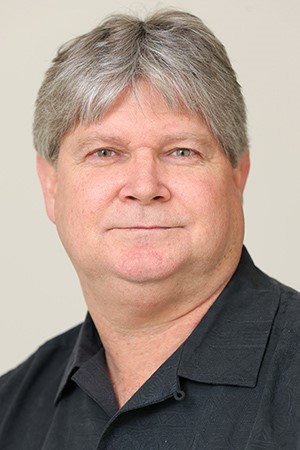
Dr. Mark Wooten, professor in the Department of Medical Microbiology and Immunology, also recently
participated in an NIH study section meeting, entitled "Eukaryotic Parasites and Vectors."
Faculty member presents research at global symposium on Lyme disease

Dr. Mark Wooten, professor and Institutional Biosafety Committee Chairman in the Department of Medical
Microbiology and Immunology, recently gave an invited research presentation at the
Global Lyme Alliance 2020 Annual Research Symposium. The title was: “Intravital Microscopy
Reveals the Importance of Spirochetal Motility and Mechanisms of Immune Evasion in
the Development of Lyme Disease.”
Dr. Wooten also recently participated as a reviewer for the NIH study section, entitled
“Immunity and Host Defense” (IHD).
Virologist awarded $1.92M NIH research grant

Principle Investigator Dr. Travis Taylor, assistant professor in the Department of Medical Microbiology and Immunology, has been awarded a five-year, R01 grant ($1.92M direct + indirect) from the National Institute of Allergy and Infectious Diseases at the NIH, entitled "Understanding the proviral role for TRAF6 interaction with the viral protease in flavivirus replication and pathogenesis."
Tick- and mosquito-borne flaviviruses (including Powassan virus, dengue virus, and West Nile virus) account for a majority of the worldwide vector-borne diseases, infecting millions, burdening the global economy with billions in healthcare costs, and are untreatable beyond supportive care.
The Taylor Lab previously identified a beneficial role for a cellular protein, called TRAF6, which is normally a central component of the host's antiviral response. TRAF6 benefits flavivirus replication through direct interaction with the viral protease enzyme called NS3. Importantly, the NS3-TRAF6 protein complex is a druggable target for flaviviruses with potential to aid new live-attenuated vaccine development. Experiments funded by the NIH grant will explore the mechanism used by TRAF6 to support flavivirus replication, yielding critical insight into the function of an essential viral enzyme. Then, by using a mouse model of virulent flavivirus infection, the study will determine the effect of TRAF6 on disease development and evaluate potential therapeutics.
The research team includes co-investigator Dr. Saurabh Chattopadhyay in the Department of Medical Microbiology and Immunology and NIH collaborator Dr. Sonja Best at Rocky Mountain Laboratories in Montana.
MMI Student AwardED Distinguished Scholarship

Congratulations to students Smrithi S. Menon and Robin Su, who were recently named recipients of the 2019-2020 Robert N. Whiteford Memorial Scholarship. This award ($300) is presented to a graduate student to assist in the performance
of research for a thesis, project or dissertation and to further the student’s professional
development.
Smrithi is a Ph.D. student in the laboratory of Dr. Viviana Ferreira in the Department
of Medical Microbiology and Immunology.
The University of Toledo is among four Ohio universities to receive a total of $2.08 million from the Ohio Department of Higher Education’s Harmful Algal Bloom Research Initiative in this year’s round of state funding to address Lake Erie water quality and find solutions for algal bloom toxicity.
UToledo researchers include Dr. Steven Haller, assistant professor in the Department of Medicine, who will work to create a new therapy for microcystin exposure and hepatotoxicity using naturally occurring Lake Erie bacteria that removes microcystin released by harmful algal blooms in drinking water. He will also conduct deep phenotyping of human organ biobank specimens for cyanotoxin exposure in at-risk populations.
The first grant (~$193K) is titled "Microcystin Degrading Bacteria as a Novel Therapy for Microcystin Exposure and Hepatotoxicity." Here they are collaborating with Dr. Jason Huntley to use the MC-LR degrading bacteria as probiotic therapy for MC-LR induced hepatotoxicity.
Click Here to Read More in the UToledo News
MMI Faculty Recognized for Promotion
Congratulations to members of our faculty who were recently approved for promotion by The University of Toledo Board of Trustees at its April meeting!
The MMI faculty member who achieved promotion to professor is


CONGRATULATIONS!
Gayatri Subramanian, Ph.D.

Congratulations!
Gayatri Subramanian successfully defended her dissertation titled: "TDRD7, a novel viral restriction factor, inhibits cellular AMP-dependent kinase to inhibit virus replication".
Advisor: Saurabh Chattopadhyay, Ph.D.
UTCOMLS students well represented in annual Three-Minute Thesis Competition

Congratulations to our graduate students who recently participated in and were recognized at the
College of Graduate Studies' 2020 Three-Minute Thesis (3MT®) Competition.
3MT celebrates the exciting research conducted by students around the world. Developed by The University of Queensland (UQ), the competition cultivates students’ academic, presentation, and research communication skills. Presenting in a 3MT competition increases their capacity to effectively explain their research in three minutes, in a language appropriate to a non-specialist audience. Competitors are allowed one PowerPoint slide, but no other resources or props.
CONGRATULATIONS, ANNA!

Anna Glanz
MSBS student in Medical Microbiology and Immunology
Faculty Adviser: Dr. Saurabh Chattopadhyay
Presentation: “‘Boosting’ Our Bodies Natural Antiviral Defense”

Congratulations!
Hallie Dolin successfully defended her dissertation titled: "Retinoic acid as a regulator of native inflammatory processes is a potential novel sepsis treatment".
Advisor: Kevin Pan, M.D., Ph.D.
Email: Hallie.Dolin@utoledo.edu
MMI students selected to present at conferences, now canceled due to coronavirus

Smrithi Sugumaran Menon, a third-year graduate student in the Department of Medical Microbiology and Immunology
and trainee of Dr. Viviana P. Ferreira, was awarded a travel support of $1,500 to
present a poster, also at the AAI's annual IMMUNOLOGY 2020 meeting in May in Hawaii.
Her abstract will be published in a special online supplement to The Journal of Immunology
late April or early May. The title of her abstract is "Assessment of function of neutrophil-derived
properdin in a novel functional assay."
Brenden Tully, a second-year graduate student in the Department of Medical Microbiology and Immunology,
mentored by Dr. Jason Huntley, was selected to present a poster at the American Society
for Microbiology (ASM) Microbe Conference, which was scheduled to be held June 18-22,
2020 in Chicago. ASM Microbe typically is attended by 10,000 – 12,000 microbiology
and infectious disease experts from around the world.
Brenden's abstract, entitled "Infection and transmission of Francisella tularensis by the American dog tick and lone star tick," describes how he has been examining infection and bacterial persistence of F. tularensis in two different U.S. tick vectors over time, with additional studies comparing bacterial transmission by both infected ticks to naïve hosts.
The Department of Medical Microbiology & Immunology welcomes new faculty member:
Tomoaki Ogino, Ph.D.
Associate Professor

On April 1, 2020 Dr. Ogino joined the department from Case Western Reserve University School of Medicine in Cleveland, OH. Dr. Ogino's skills, expertise, and research, as a virologist, will be demonstrated as he will play a very important role in the current COVID-19 research collaboration project with our outstanding group of virologist on campus.
Dr. Ogino's laboratory has been focused on understanding the fundamental molecular mechanisms of gene expression of nonsegmented negative strand (NNS) RNA viruses. NNS RNA viruses include many important human pathogens, such as rabies, human parainfluenza, respiratory syncytial, measles, and Ebola; however, at present there are no effective drugs against these viruses. He brings with him an R01 NIH grant.
WELCOME!
MMI Staff members named Women of Week by the UToledo Eberly Center
The UToledo Catharine S. Eberly Center for Women recognizes outstanding students, faculty, and staff by highlighting a woman of the week in its weekly newsletter. "We want to applaud the women on campus who make a difference every day in the work that they do, the people they interact with, and the communities they serve," according to the center.
Laura Brown and Pam DeWalt, two staff members from the Department of Medical Microbiology and Immunology, were recently featured in the Eberly Center's weekly newsletter.
Learn More and Read the InterviewsFaculty members participate in UToledo panel on coronavirus outbreak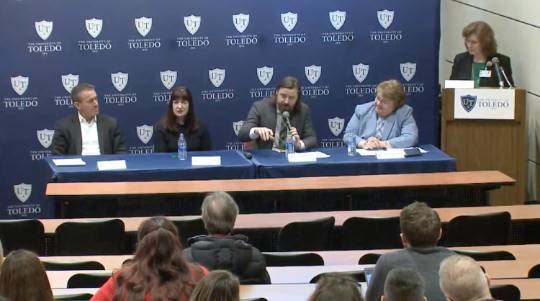
On March 4, The University of Toledo hosted a public forum on the coronavirus outbreak with top scholars from the College of Medicine and Life Sciences and the College
of Nursing with specific expertise in public health, infectious diseases, immunology,
and microbiology.
As a public research university, UToledo regularly shares our scholarly and research
expertise on major issues impacting the public.
The discussion was moderated by Dr. Joan Duggan, professor of medicine, an infectious disease specialist, and Senior Associate Dean
for Faculty Affairs & Development.
UToledo experts on the panel include: Dr. Jennifer Hanrahan, associate professor of medicine and chief of the Division of Infectious Disease;
Dr. Jason Huntley, associate professor of medical microbiology and immunology; Dr. Linda Lewandowski, professor and dean of the College of Nursing; and Dr. R. Travis Taylor, assistant professor of medical microbiology and immunology.
Watch highlights from the discussion below. Watch a report by NBC 24.
Congratulations to our MD/PhD candidate, Sara!
Sara Moore, a MD/PhD candidate in the laboratory of Dr. Viviana P. Ferreira in the Department of Medical Microbiology and Immunology was recently awarded a Microgrant
from the Joint Biology Consortium, an NIH-funded collaborative network supporting innovative research in arthritis.
This grant will support Sara’s research on the role of the complement system, an essential
part of the adaptive and innate immune response, in rheumatoid arthritis. Specifically,
Sara is interested in characterizing a protein called properdin, an enhancer of complement
activity, to better understand how complement facilitates a proinflammatory environment
in rheumatoid arthritis and other autoimmune diseases.
MMI Researcher Co-Chairs Biothreats Conference
Dr. Jason Huntley, Associate Professor in the Department of Medical Microbiology and Immunology, recently
served as co-chair for the 2020 American Society for Microbiology (ASM) Biothreats
Conference in Washington, D.C.

Over the course of the last year, Dr. Huntley and a team of national experts in infectious
diseases, diagnostics, therapeutics, and vaccine development organized and invited
over 60 speakers to present their latest breakthroughs to prevent and treat viral
and bacterial diseases.
ASM Biothreats 2020 featured an opening keynote presentation by Dr. Anthony Fauci
(NIH-NIAID), who spoke about U.S. government efforts to diagnose, contain, and quickly
develop a DNA-based vaccine against the novel 2019 coronavirus that is of worldwide
concern. ASM Biothreats 2020 also featured presentations by Avril Benoit from Doctors
Without Borders, Christopher Houchens from the Biomedical Advanced Research and Development
Authority (BARDA), and Douglas Bryce from the U.S. Department of Defense Joint Program
Executive Office for Chemical, Biological, Radiological and Nuclear Defense (JPEO-CBRND),
among other presenters. Nearly 700 physicians, scientists, and government policy
makers attended this three-day conference.
MMI faculty member Dr. R. Mark Wooten and Department Chair Dr. Kevin Pan were recognized
for their contributions to preventing and treating global health challenges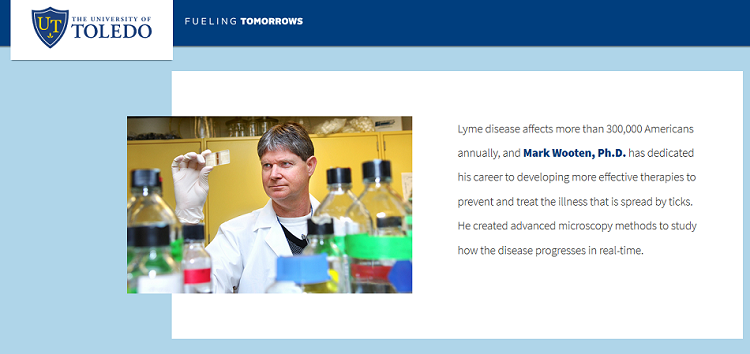
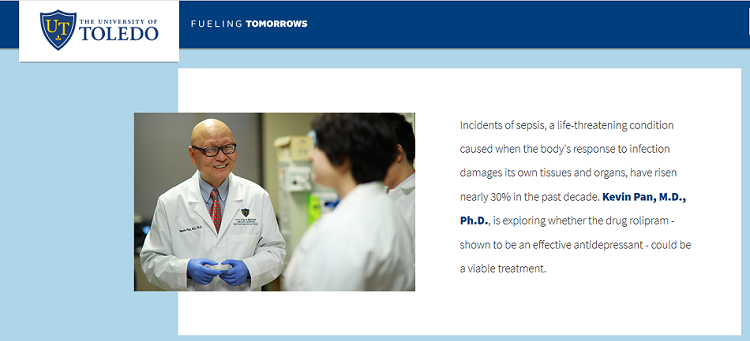
Click Here to learn about how UToledo is developing solutions to prevent and treat
global health challenges
Huntley Lab Research Published in Ohio Sea Grant magazine on producing safe drinking
water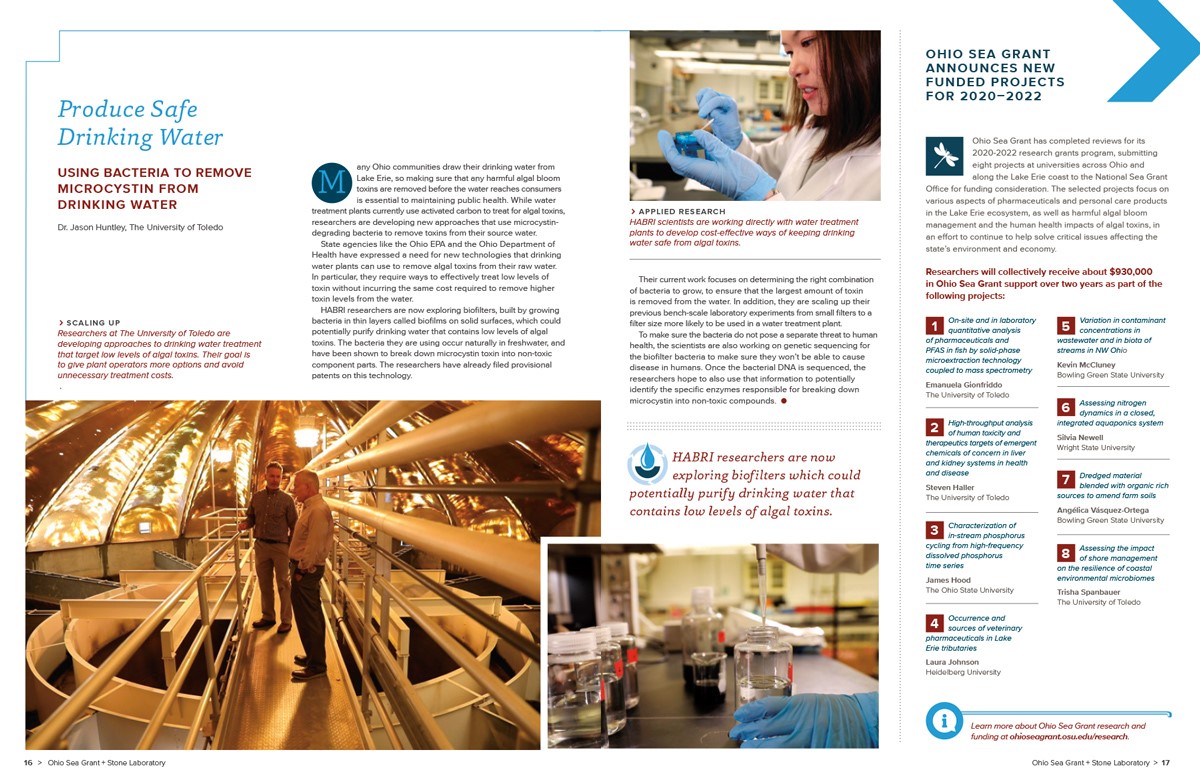
Click Here to Download the Article
Research from the laboratory of Dr. Jason Huntley, associate professor in the Department of Medical Microbiology and Immunology, was
featured in a recent issue of the Ohio Sea Grant magazine, Twine Line.The article on pages 16 and 17, titled "Produce Safe Drinking Water: Using Bacteria
to Remove Microcystin from Drinking Water," highlights efforts by Dr. Huntley's research
group to develop new methods to remove the microcystin toxin, MC-LR, from drinking
water.Harmful algal blooms and their toxins cause serious threats to human health
here in Ohio and around the world. MC-LR, in particular, is known to cause liver cancer,
as well as respiratory and gastrointestinal distress, skin rashes, and other complications
in humans. Federal and state agencies, including the Environmental Protection Agency
(EPA), National Oceanic and Atmospheric Administration (NOAA), Ohio EPA, and the Ohio
Department of Health (ODH) have emphasized the need for new water treatment technologies
to aid in MC-LR removal from contaminated water sources. Dr. Huntley's group has
isolated naturally-occurring bacteria from Lake Erie that degrade MC-LR into non-toxic
breakdown products.The Huntley research group currently is working on two main projects
to produce safe drinking water: First, they are using these MC-LR degrading bacteria
in biologically-active water filters – biofilters – to remove the MC-LR toxins and
produce safe drinking water; Second, they are performing whole-genome sequencing on
their MC-LR degrading bacteria to identify MC-LR degrading enzymes, which could be
purified for water treatment.
Researchers Seek New Treatment for Sepsis Through Innovative Approach
New research from The University of Toledo College of Medicine and Life Sciences suggests
it may be possible to treat septic shock with drugs that are already part of the clinical
repertoire. Screening existing pharmaceutical agents for unexpected applications
is increasingly seen as a valuable tool for establishing new treatments, particularly
within the field of oncology research.
Dr. Kevin Pan, professor and chair of the UToledo Department of Medical Microbiology and Immunology,
is applying that innovative approach to sepsis, a life-threatening condition in which
the body’s extreme immune response to infection damages its own organs. By exploring
new ways to modulate that immune response, Pan and his collaborators hope to provide
a complimentary treatment to go along with antibiotics that can prevent damage to
critical organ systems.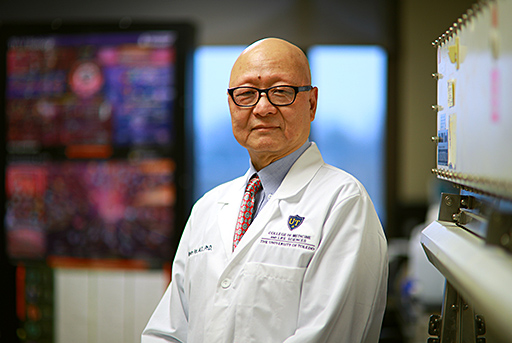
Click Here to Access the full UToledo Article
MMI Department Chair speaks to student group about his journey to becoming a physician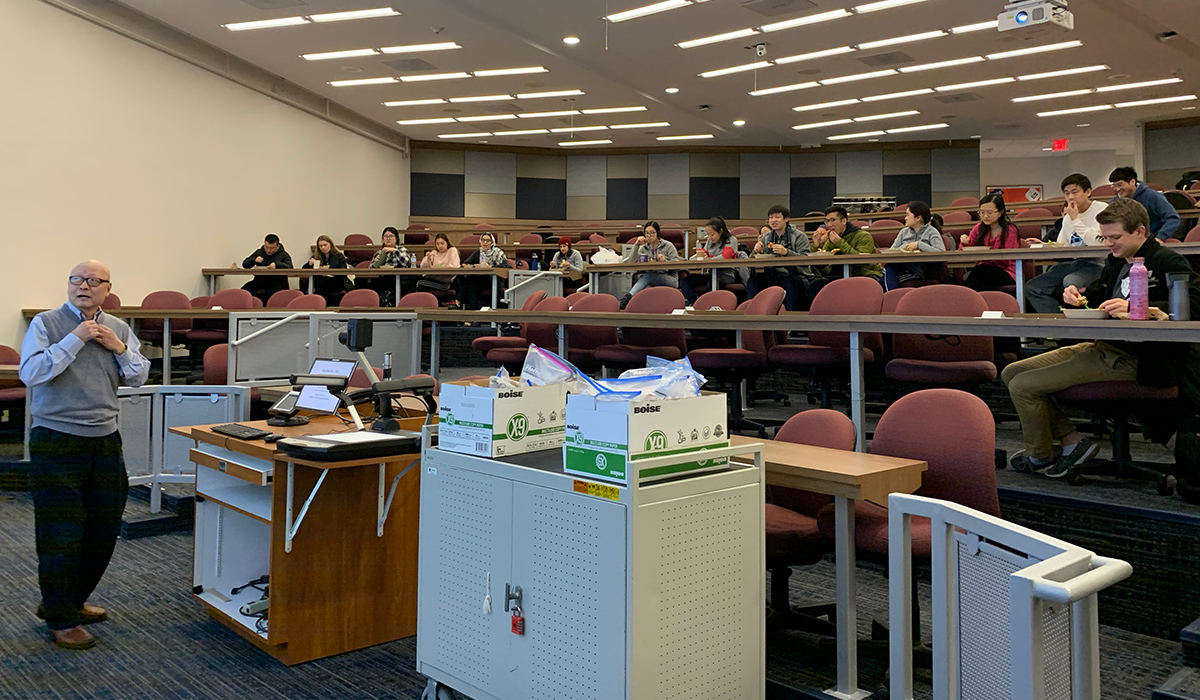
APAMSA is a national organization that brings students together that are involved in the unique health issues of Asian American and Pacific Islanders in the United States. Its focus is promoting the health and well-being of these communities. The goal of the UToledo chapter is to foster a strong community between medical students, physicians, and other healthcare professionals by providing opportunities for cultural enrichment and engaging with our community to develop health initiatives. In addition, the club strives to illuminate the collective Asian American experience by holding events that serve as space for discussions, such as lunch talks, social meetings, and more.
During this lunch talk, Dr. Pan shared stories of growing up in China and his journey to becoming a physician. From being a barefoot doctor in rural parts of China to a professor and chair of the Department of Microbiology and Immunology, Dr. Pan is proof that you can never go wrong with hard work and following your dreams.
The students' intention with this lunch talk was to provide a space for open discussion about ethnic minorities in medicine, as well as allow medical students of varying backgrounds to interface with and learn from a successful APIA physician.
Congratulations to Irum Syed on her Toledo Blade article, "Accurately identifying Melioidosis can be problematic" published on 01/06/2020
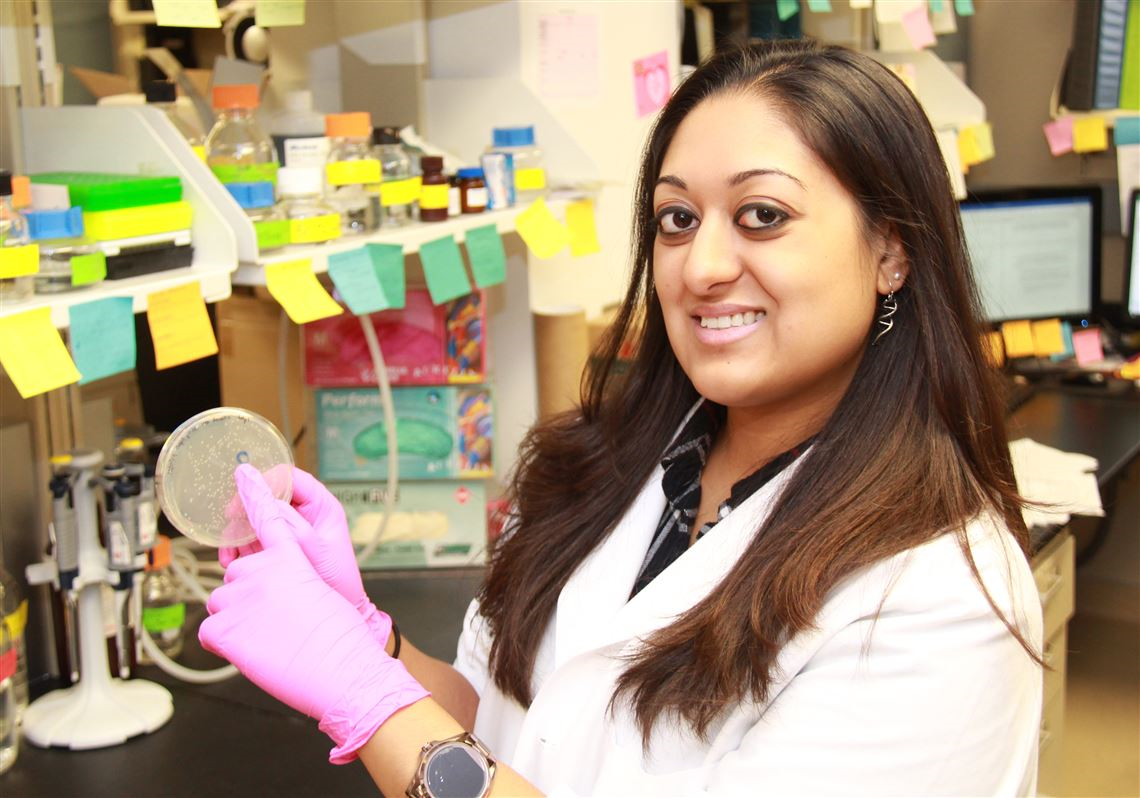
MMI University of Toledo 2019-2020 Graduate Research Awardees
Congratulations to Gayatri Subramanian!
Gayatri Subramanian, PhD candidate in the laboratory of Dr. Saurabh Chattopadhyay, Assistant Professor, in the Department of Medical Microbiology and Immunology, was recently awarded the
University of Toledo 2019-2020 Graduate Research Award. This UToledo Graduate Student Association (GSA) Graduate Research Award will provide $2,000 towards Gayatri’s research project that focuses on understanding
how herpes simplex virus – 1 (HSV-1), a major human pathogen, hijacks host proteins
to its benefit. Current approach to address this question is by using cellular and
molecular techniques, such as genetic and pharmacological inhibition of the host protein,
which HSV-1 depends on. The target protein was identified in the process of understanding
the antiviral mechanisms of a novel interferon stimulated gene (ISG), Tudor domain
containing protein 7 (Subramanian et al, PLoS Pathogens, 2018). The GSA award will
help investigate the molecular mechanisms of this novel host-virus interaction.
Congratulations to Brenden Tully!
Brenden Tully, MSBS student in Dr. Jason Huntley’s lab in the Department of Medical Microbiology
and Immunology, recently was awarded the University of Toledo 2019-2020 Graduate Research
Award. This UToledo Graduate Student Association (GSA) Graduate Research Award will provide $2,000 towards Mr. Tully’s research project to study how the highly-infectious
and deadly bacterium, Francisella tularensis – the causative agent of tularemia, infects different U.S. tick species and identify
which tick species poses the greatest risk to human health. Climate change has led
to significant expansion of the geographic ranges of different tick species in the
U.S. Ticks are known to harbor and transmit dozens of infectious diseases to humans,
including Lyme disease, Rocky Mountain Spotted Fever, and tularemia. Two ticks, the
American dog tick and the Lone Star tick, are believed to be the primary tick vectors
for tularemia but actual data is severely lacking. Mr. Tully has developed a mouse-tick-F. tularensis infection model to naturally infect both American dog ticks and Lone Star ticks ticks
with F. tularensis, examine bacterial replication in each tick, and test transmission efficiency of
infected ticks to naïve mice.



